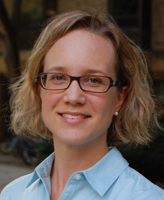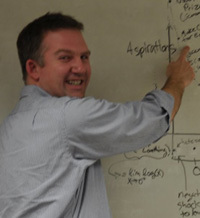
This year, the National Bureau of Economic Research (NBER) appointed Assistant Professors Eric Sims and Abigail Wozniak as research fellows, a validation of their ongoing work in the field—and testament to the growing influence of Notre Dame’s Department of Economics.
The NBER is a nonprofit, nonpartisan research organization dedicated to promoting a greater understanding of how the economy works. It disseminates unbiased economic research to policymakers, academics, and the business community worldwide.
“Only about 1,100—or less than 5 percent of all economists in the world—have been appointed as NBER researchers,” says Professor Richard Jensen, chair of the Department of Economics. “This distinguished group includes 18 of the 31 American Nobel Prize winners in economics and six chairs of the President’s Council of Economic Advisers.
“That Abbie and Eric were invited to join this illustrious group indicates that their research is not only on the cutting edge of economic science but also has relevance to understanding both current economic conditions and economic policy,” Jensen says.
In addition to Wozniak and Sims, Keough-Hesburgh Professor of Economics William Evans and Alfred C. DeCrane, Jr., Professor of International EconomicsNelson Mark are NBER research associates; Assistant Professor Daniel Hungerman and Joseph P. Kaboski, the David F. and Erin M. Seng Foundation Associate Professor of Economics, are research fellows; and Professor Robert Flood is a former research associate.
Both Sims and Wozniak emphasize the connections between their research and the lives—and livelihoods—of real people in the community.

“Loosely speaking, my research is focused on why we have business cycles,” Sims says. “Why does the economy go up and down? And once we have a better understanding of why, what do we do about it? These are questions that have bearing on people’s lives.”
Sims, who joined the Notre Dame faculty in 2009, is studying the changing nature of economic fluctuations. For example, productivity and output have historically gone up and down together but not recently. One reason, he posits, is that recessions have become less about weak demand and more about reallocation of resources.
“To tie that to the real world, going into this recession we had too many people making houses,” he says. “Those people have to find jobs doing something else. This is what we mean by reallocation. In the old-style recessions, people would say the government should spend more money and stimulate demand. But if the recession isn’t about demand being low, you don’t necessarily want to fight it that way. You might need to help people move into another skill set to deal with the blow they’ve been dealt, and thus there are implications about the duration and size of unemployment benefits, for example.”
Wozniak, a faculty member since 2005, is currently focusing on how the economy affects the location decisions and wages of individuals entering the labor market. Do they move out of states that are doing poorly to states with lower employment and higher growth?
Wozniak has found that education is a key factor. “College graduates are much more responsive to conditions when choosing where to live as they start their careers,” she says. “But, that doesn’t help them escape the impact of negative conditions on their wages even five to 10 years later.”
Wozniak is also starting to look into the trend of drug testing by employers. “More than half of the workers in the United States at any given time work for an employer who drug tests,” she says. “In many industries, every worker is tested before they can be hired. It’s a huge program that no one knows much about.”
And that’s exactly why Wozniak is working to shed light on subjects like this that have an impact on people’s daily lives. “Our working lives are so important,” she says, “I’ve always been excited about the questions that this field offers.”


